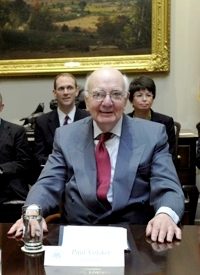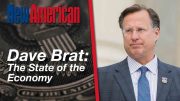
With the announcement by Reuters that former Federal Reserve Chairman Paul Volcker was going to resign shortly from the Obama administration came the temptation to reminisce about Volcker’s influence during the late ’70s and early ’80s when inflation exceeded 13 percent and interest rates on short-term government Treasury bills hit 21.5 percent.
Volcker’s bona fides as an insider are impeccable: degrees from Princeton and Harvard, then two years at the London School of Economics, followed by five years as an economist at the Federal Reserve Bank of New York and then joining the Rockefeller Family’s Chase Manhattan Bank. He served as Under Secretary of the Treasury and assisted in helping President Nixon take the United States off the American dollar’s international gold-exchange standard in 1971. After that he served as president of the center of power for the Federal Reserve System at the New York Federal Reserve Bank. In 1979, President Jimmy Carter nominated Volcker to chair the Fed itself, a position he held until 1987.
Along the way he became a founding member of the Trilateral Commission and a member of the Council on Foreign Relations. He remains intimately involved with the Rockefeller banking interests, serving for 30 years as a member of the Trust Committee of the Rockefeller Group, which manages much of the Rockefeller family’s financial interests. He also served as chairman of the Group of Thirty, an international policy think-tank which began at the instigation of the Rockefeller Foundation.
When Carter nominated Volcker to head the Fed in 1979, the economy was in serious trouble. The inflation generated by the Fed’s continued increases in the money supply began manifesting itself in significant rises in consumer prices and the previous Fed chair, G. William (“Gee Whiz”) Miller, was not up to the task of reining in the printing presses. Very simply, Volcker bit the bullet and stopped the purchase of government securities that were keeping interest rates artificially low. Prices of commodities continued moving higher for a few months, but the end was in sight. Gold hit a high of $850 an ounce (and silver $50 an ounce) in January, 1980, and then plunged, reflecting the “new normal” initiated by Volcker.
PBS conducted a revealing interview with Volcker in late 2000 that confirmed his understanding of the role the Fed had in creating the nearly runaway inflation of the time, and what needed to be done to unwind it. The interviewer for PBS asked Volcker:
You used to talk about slaying the inflationary dragon. What did you set out to do?
Volcker: I certainly thought that inflation was a dragon that was eating at our innards, or more than our innards, and if anybody was going to deal with this it was going to have to be the Federal Reserve. I saw … the need … to slay the dragon.
Can you explain in general terms what you did?
Volcker: [It was necessary] to face up to the need [to take charge of] monetary policy and control the money supply, to accept the proposition that at the end of the day inflation is dependent upon inflationary monetary growth: too much money growth, too much credit growth…. We [just had to] stop this and draw some kind of line in the sand.
Knowledgeable experts on the Federal Reserve’s operations often use the analogy of a heroin addict who must simply get another fix, or go into withdrawal. Each fix must be larger than the previous one to get the desired “buzz.” As the interview with Volcker continued, Volcker’s understanding of exactly the role the Fed plays in providing the “juice” to the economy became crystal clear:
I remember one of my professors at Harvard [lecturing] about [how] in the postwar period people were worried about sluggishness and that “a little bit of inflation is a good thing.” Of course, what happens then [is] you get a little bit of inflation, and then you need a little more because it props up the economy. People get used to it, and it loses its effectiveness. Like a [drug addict], you need a new [fix]; then you need a new one plus.
PBS: Why is [inflation] a moral issue? What does it actually corrode?
Volcker: It corrodes trust, particularly trust in government. It is a governmental responsibility to maintain the value of the currency that they issue. And when they fail to do that, it is something that undermines an essential trust in government.
As trust in government today continues to decline, trust in the engine of inflation that is responsible for the devaluation of the American currency, the Federal Reserve System, also continues to decline. It is with eager anticipation, then, that the current Fed chair, Ben Bernanke, will be forced to expose the truth behind the Fed’s machinations and create increasing understanding that Volcker knew all along: Inflation is always and everywhere a monetary phenomenon, as Chicago University Professor Milton Friedman liked to say, and with the destruction of the currency comes the destruction of society.
Volcker was forthright in his responses; it’ll be interesting to see if the current chair will be as forthright and insightful, helping citizens to understand more completely the shell game to which they have been subjected lo these many years.
Photo: Paul Volcker, chairman of the President’s Economic Recovery Advisory Board, during a meeting in the Roosevelt Room of the White House in Washington, April 16, 2010: AP Images



